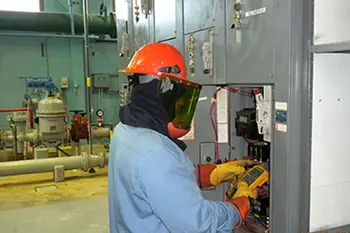High Voltage Safety Training - This 6-Hour (one day course) live online instructor led course is designed for electrical maintenance personnel responsible for Medium Voltage/High Voltage electrical systems, supervisory and health and safety professionals who are responsible for overseeing high voltage electrical safety work.
Dynamic and highly concentrated, this High Voltage Safety Training course places maximum emphasis on safety when working on or near energized electrical equipment.
Students will develop the knowledge and skills to properly assess the potential damage electricity can cause to the human body and understand the basic principles of safety in normal and abnormal conditions. They will also learn how to provide assistance in determining severity of potential exposure to Medium Voltage/High Votlage arc flash hazards, planning safe work practices and selecting proper personal protective equipment. They will also learn how NFPA 70e governs electrical hazards in distribution systems, as well as OSHA 1910.269.
During this High Voltage Safety Training course you will learn to recognize and avoid electric shock in unsafe work areas. You will also learn correct approach distances. Upon completion, you will have a better understanding of proper voltage rated tools and the use of proper personal protection equipment. By educating workers on issues central to the safe performance of their everyday jobs, loss of life or serious injuries can be reduced and eliminated from your workplace. Your safety and the safety of your coworkers depend on it!
Review National, State and Provincial Medium Voltage/High Voltage electrical safety standards and regulations.
This One-Day High Voltage Safety Training Course Will Focus On The Following Areas:
- Job Briefing Requirements
- Hazardous Energy Control (lockout/tagout)
- Switching Procedures
- Clearance Procedures
- Personal Protective Equipment (PPE)
- Flame Resistant (FR) Clothing
- Rubber Protective Equipment
- Live-Line Tools & Testing Requirements
- Working On or Near Exposed Lines
- De-energizing Lines and Equipment
- Personal Protective Grounding
- Substation Safety
- Special Conditions
- Capacitors
- Current Transformers
- Potential Transformer Hazards
- Fuse/Relay Coordination
- High Voltage Safety Training Requirements
Students Will:
- Learn to recognize all Medium Voltage/High Voltage electrical sources and hazards created by various high voltage electrical equipment and devices.
- Determine the controls used to protect workers from all energy sources created in the work place.
- Learn the dangers of how induced currents and ground gradients are produced
- Learn how to safely select, install and maintain temporary grounds for protection of the high voltage electrical worker.
Interpret and use a single line diagram to write a switching sequence to safely isolate a high voltage electrical device for work. Validate existing operating orders and switching procedures. Develop and maintain mandated documentation for all electrical equipment isolation and maintenance work.


